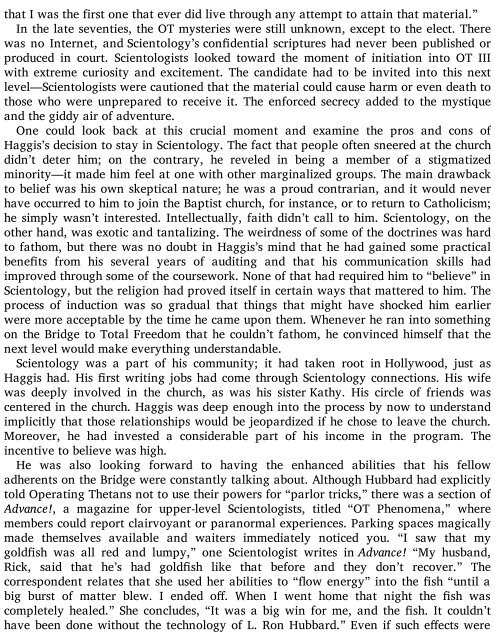going-clear-scientology-hollywood-and-the-prison-of-belief-by-lawrence-wright-2
going-clear-scientology-hollywood-and-the-prison-of-belief-by-lawrence-wright-2
going-clear-scientology-hollywood-and-the-prison-of-belief-by-lawrence-wright-2
You also want an ePaper? Increase the reach of your titles
YUMPU automatically turns print PDFs into web optimized ePapers that Google loves.
that I was <strong>the</strong> first one that ever did live through any attempt to attain that material.”<br />
In <strong>the</strong> late seventies, <strong>the</strong> OT mysteries were still unknown, except to <strong>the</strong> elect. There<br />
was no Internet, <strong>and</strong> Scientology’s condential scriptures had never been published or<br />
produced in court. Scientologists looked toward <strong>the</strong> moment <strong>of</strong> initiation into OT III<br />
with extreme curiosity <strong>and</strong> excitement. The c<strong>and</strong>idate had to be invited into this next<br />
level—Scientologists were cautioned that <strong>the</strong> material could cause harm or even death to<br />
those who were unprepared to receive it. The enforced secrecy added to <strong>the</strong> mystique<br />
<strong>and</strong> <strong>the</strong> giddy air <strong>of</strong> adventure.<br />
One could look back at this crucial moment <strong>and</strong> examine <strong>the</strong> pros <strong>and</strong> cons <strong>of</strong><br />
Haggis’s decision to stay in Scientology. The fact that people <strong>of</strong>ten sneered at <strong>the</strong> church<br />
didn’t deter him; on <strong>the</strong> contrary, he reveled in being a member <strong>of</strong> a stigmatized<br />
minority—it made him feel at one with o<strong>the</strong>r marginalized groups. The main drawback<br />
to <strong>belief</strong> was his own skeptical nature; he was a proud contrarian, <strong>and</strong> it would never<br />
have occurred to him to join <strong>the</strong> Baptist church, for instance, or to return to Catholicism;<br />
he simply wasn’t interested. Intellectually, faith didn’t call to him. Scientology, on <strong>the</strong><br />
o<strong>the</strong>r h<strong>and</strong>, was exotic <strong>and</strong> tantalizing. The weirdness <strong>of</strong> some <strong>of</strong> <strong>the</strong> doctrines was hard<br />
to fathom, but <strong>the</strong>re was no doubt in Haggis’s mind that he had gained some practical<br />
benets from his several years <strong>of</strong> auditing <strong>and</strong> that his communication skills had<br />
improved through some <strong>of</strong> <strong>the</strong> coursework. None <strong>of</strong> that had required him to “believe” in<br />
Scientology, but <strong>the</strong> religion had proved itself in certain ways that mattered to him. The<br />
process <strong>of</strong> induction was so gradual that things that might have shocked him earlier<br />
were more acceptable <strong>by</strong> <strong>the</strong> time he came upon <strong>the</strong>m. Whenever he ran into something<br />
on <strong>the</strong> Bridge to Total Freedom that he couldn’t fathom, he convinced himself that <strong>the</strong><br />
next level would make everything underst<strong>and</strong>able.<br />
Scientology was a part <strong>of</strong> his community; it had taken root in Hollywood, just as<br />
Haggis had. His rst writing jobs had come through Scientology connections. His wife<br />
was deeply involved in <strong>the</strong> church, as was his sister Kathy. His circle <strong>of</strong> friends was<br />
centered in <strong>the</strong> church. Haggis was deep enough into <strong>the</strong> process <strong>by</strong> now to underst<strong>and</strong><br />
implicitly that those relationships would be jeopardized if he chose to leave <strong>the</strong> church.<br />
Moreover, he had invested a considerable part <strong>of</strong> his income in <strong>the</strong> program. The<br />
incentive to believe was high.<br />
He was also looking forward to having <strong>the</strong> enhanced abilities that his fellow<br />
adherents on <strong>the</strong> Bridge were constantly talking about. Although Hubbard had explicitly<br />
told Operating Thetans not to use <strong>the</strong>ir powers for “parlor tricks,” <strong>the</strong>re was a section <strong>of</strong><br />
Advance!, a magazine for upper-level Scientologists, titled “OT Phenomena,” where<br />
members could report clairvoyant or paranormal experiences. Parking spaces magically<br />
made <strong>the</strong>mselves available <strong>and</strong> waiters immediately noticed you. “I saw that my<br />
goldsh was all red <strong>and</strong> lumpy,” one Scientologist writes in Advance! “My husb<strong>and</strong>,<br />
Rick, said that he’s had goldsh like that before <strong>and</strong> <strong>the</strong>y don’t recover.” The<br />
correspondent relates that she used her abilities to “ow energy” into <strong>the</strong> sh “until a<br />
big burst <strong>of</strong> matter blew. I ended o. When I went home that night <strong>the</strong> sh was<br />
completely healed.” She concludes, “It was a big win for me, <strong>and</strong> <strong>the</strong> sh. It couldn’t<br />
have been done without <strong>the</strong> technology <strong>of</strong> L. Ron Hubbard.” Even if such eects were


